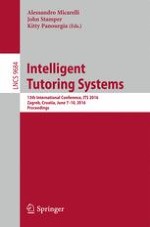2016 | OriginalPaper | Buchkapitel
Predicting Learning from Student Affective Response to Tutor Questions
verfasst von : Alexandria K. Vail, Joseph F. Grafsgaard, Kristy Elizabeth Boyer, Eric N. Wiebe, James C. Lester
Erschienen in: Intelligent Tutoring Systems
Aktivieren Sie unsere intelligente Suche, um passende Fachinhalte oder Patente zu finden.
Wählen Sie Textabschnitte aus um mit Künstlicher Intelligenz passenden Patente zu finden. powered by
Markieren Sie Textabschnitte, um KI-gestützt weitere passende Inhalte zu finden. powered by
